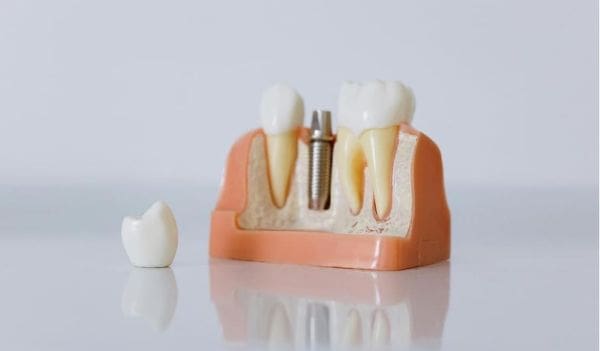Dental implants represent a significant leap forward in dental restoration technology, offering a solution that closely mimics natural teeth in both appearance and function. This guide aims to demystify the process of getting dental implants, from the initial assessment to the aftercare, providing a thorough understanding of what patients can expect.
What Are Dental Implants?
Dental implants are titanium fixtures implanted into the jawbone to replace missing tooth roots. Over time, these implants fuse with the bone, providing a stable base for attaching crowns, bridges, or dentures. This fusion process, known as osseointegration, is the cornerstone of the implant’s durability and longevity.
Why Consider Dental Implants?
Dental implants offer a unique combination of benefits that make them a preferred option for replacing missing teeth. Unlike traditional dentures or bridges, implants provide a fixed solution that closely mimics natural teeth, both aesthetically and functionally. Here are some compelling reasons to consider them:
- Natural Look and Feel: Dental implants are designed to look, feel, and function like your natural teeth. They restore not only the appearance of your smile but also your ability to chew and speak with ease.
- Preservation of Bone Structure: When a tooth is lost, the jawbone can begin to deteriorate over time due to lack of stimulation. Implants act as artificial tooth roots, providing the necessary stimulation to preserve the bone and maintain the facial structure.
- Durability and Longevity: With proper care, dental implants can last a lifetime. Made from biocompatible titanium, they integrate with the jawbone, creating a durable foundation for the replacement teeth.
- Improved Oral Health: Unlike bridges, which require altering adjacent teeth, implants do not require any modifications to surrounding teeth, preserving more of your natural tooth structure. Additionally, implants make it easier to maintain good oral hygiene, reducing the risk of decay and gum disease.
- Increased Confidence: Missing teeth can affect your confidence and willingness to smile. Dental implants restore the appearance of your teeth and your self-esteem along with it.
The Procedure: From Consultation to Completion
- Initial Consultation and Examination: The journey begins with a detailed examination of the patient’s oral health and jaw structure. This step often involves 3D imaging techniques to assess bone quality and plan the implant placement.
- Planning and Design: Using the data gathered, dental professionals create a personalised treatment plan. This plan includes selecting the appropriate type and size of implants and designing the final prosthetic restoration.
- Implant Surgery: Performed under local anaesthesia or sedation, the implant surgery involves placing the titanium post into the jawbone. The complexity of the surgery varies depending on the number of implants and the patient’s specific needs.
- Healing and Osseointegration: After the surgery, a period of healing is required for the implant to integrate with the bone. This process can take several months, during which the implant becomes securely anchored in place.
- Attaching the Prosthesis: Once osseointegration is complete, the final step involves attaching the prosthetic tooth or teeth to the implant. This phase may include taking impressions to ensure the prosthesis fits perfectly within the bite.
- Aftercare and Maintenance: Following the procedure, regular check-ups and proper oral hygiene are crucial to ensure the longevity of the implant. Like natural teeth, implants require brushing, flossing, and professional cleanings.
Costs and Considerations
The cost of dental implants can vary widely, influenced by factors such as the number and type of implants, the complexity of the procedure, and geographic location. Here’s what to consider when evaluating the cost:
- Initial Investment vs. Long-Term Value: While the upfront cost of dental implants may be higher than other restoration options, their durability and longevity can make them more cost-effective in the long run.
- Quality of Life: Dental implants can significantly improve quality of life by allowing for normal eating, speaking, and smiling without the worry of slipping dentures or the discomfort of missing teeth.
- Insurance and Financing: Some insurance plans may cover part of the cost of dental implants. Additionally, many dental practices offer financing options to help manage the expense.
- Expertise and Materials: The cost reflects not just the materials used but also the expertise of the dental team. Choosing a skilled implant dentist and high-quality implants is crucial for the success and longevity of the treatment.
Who is Suitable for Dental Implants?
Most adults in good general and oral health are candidates for dental implants. However, certain conditions, such as insufficient bone density or uncontrolled chronic diseases, may require additional treatment before proceeding with implants.
The Importance of Choosing the Right Dental Practice
Selecting a dental practice with experienced implantologists and advanced technology is crucial. A skilled team can ensure a smoother process, from precise implant placement to the creation of custom prosthetics that seamlessly integrate with the patient’s natural teeth.
Conclusion
Dental implants offer a revolutionary approach to restoring missing teeth, combining the best of modern dentistry’s aesthetic and functional capabilities. Understanding the comprehensive journey of getting dental implants—from the initial consultation through meticulous planning, surgical procedures, and aftercare—can help individuals make informed decisions about their dental health. With the right care and maintenance, dental implants can provide a lifetime of smiles and functional benefits.
